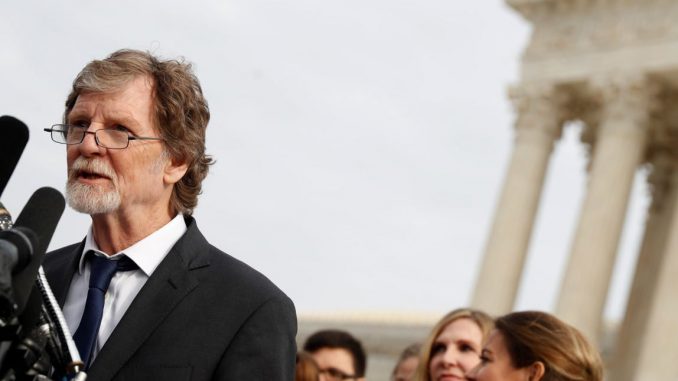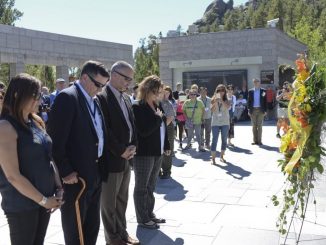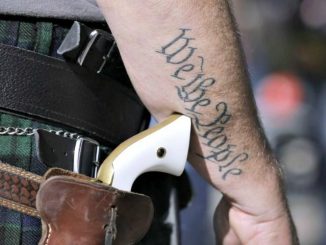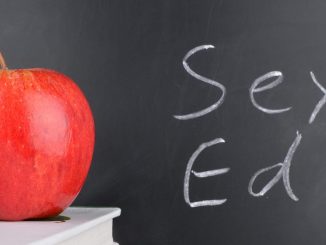
The U.S. Supreme Court issued a narrow ruling Monday in favor of a Christian baker who declined to bake a custom wedding cake for a same-sex wedding, concluding a state agency did not apply anti-discrimination law in a neutral manner.
Justice Anthony Kennedy wrote the opinion for a seven-justice majority. Justice Ruth Bader Ginsburg dissented, joined by Justice Sonia Sotomayor.
The case was occasioned when David Mullins and Charlie Craig, a gay couple, entered Jack Phillips’ Masterpiece Cake shop in Lakewood, Colo in 2012. After a short discussion with the prospective patrons, Phillips said he would not sell them a custom wedding cake due to his deeply-held religious beliefs. Mullins and Craig filed a complaint with the Colorado Civil Rights Commission, prompting a lengthy legal battle culminating in an appeal to the high court.
Kennedy explained that the Colorado law can validly protect LGBT patrons, but found the state agency applied the law in a manner hostile towards Phillips’ evangelical beliefs.
Widget not in any sidebars
“As the record shows, some of the commissioners at the commission’s formal, public hearings endorsed the view that religious beliefs cannot legitimately be carried into the public sphere or commercial domain, disparaged Phillips’ faith as despicable and characterized it as merely rhetorical, and compared his invocation of his sincerely held religious beliefs to defenses of slavery and the Holocaust,” Kennedy wrote.
He also noted that the commission’s decision respecting Phillips was inconsistent with its treatment of similar disputes. On three occasions the state civil rights division found in favor of merchants who declined to create cakes conveying messages disparaging same-sex couples or promoting orthodox Christian belief. (RELATED: Supremes Lift Decision Ordering Trump Administration To Facilitate Abortions For Alien Minors)
In those instances, the agency concluded that the expression requested could reasonably be attributed to the bakers, justifying their refusal to accommodate the patrons. Those decisions also explained that the bakeries at issue produced goods for religious life cycle events like baptisms, bar mitzvahs, or first communions, defeating claims of anti-religious animus.
In Phillips’ case, on the other hand, the commission said the cake’s message could only be imputed to the customer, and ignored his willingness to sell generic baked good to all comers.
“In view of these factors, the record here demonstrates that the commission’s consideration of Phillips’ case was neither tolerant nor respectful of his religious beliefs,” the decision reads.
Kennedy also conceded Phillips could fairly assume his actions were lawful, since the events in question took place in 2012. At that time same-sex marriage was not legal in Colorado, and the high court had not handed down its landmark decisions in U.S. v. Windsor, which struck down the federal Defense of Marriage Act and Obergefell v. Hodges, which legalized gay marriage.
The ruling derives in part from the Supreme Court’s 1992 decision in Church of the Lukumi Babalu Aye v. City of Hialeah, in which the justices struck down a city ordinance forbidding animal sacrifice. The provision was adopted to curtail the practice of Santeria, a syncretic religion incorporating elements of Catholicism and west African paganism. The high court explained that Hialeah’s law was unconstitutional because it was gerrymandered to disfavor a particular religion.
The decision is silent as to whether a First Amendment objection can defeat a general and neutral public accommodations law, the legal question at the heart of the Masterpiece case.
As such, the ruling is largely confined to the facts at hand, with limited application in related cases. Indeed, it is of limited utility to merchants seeking conscience-based exceptions to public accommodation requirements, as it leaves open the possibility that anti-discrimination agencies can persist in disfavoring religious dissenters, provided the animus is not detectable.
Widget not in any sidebars
Mullins and Craig said the decision necessitates further action to vindicate LGBT rights.
“Today’s decision means our fight against discrimination and unfair treatment will continue,” they said in a statement via the American Civil Liberties Union. “We have always believed that in America, you should not be turned away from a business open to the public because of who you are. We brought this case because no one should have to face the shame, embarrassment, and humiliation of being told ‘we don’t serve your kind here’ that we faced, and we will continue fighting until no one does.”
For their part, Phillips’ lawyers trumpeted the holding as a victory for religious liberty.
“Tolerance and respect for good-faith differences of opinion are essential in a society like ours,” said Kristen Waggoner, senior counsel at the Alliance Defending Freedom. “This decision makes clear that the government must respect Jack’s beliefs about marriage.”
Justice Elena Kagan wrote a concurring opinion joined by Justice Stephen Breyer. Justice Neil Gorsuch wrote a concurring opinion joined by Justice Samuel Alito. Justice Clarence Thomas also filed a concurring opinion, which Gorsuch joined.






Be the first to comment